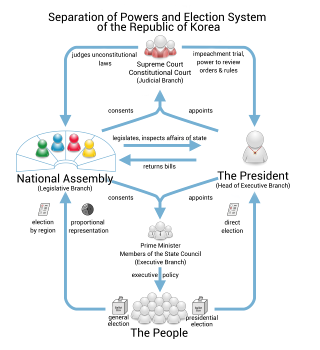
The politics of South Korea take place in the framework of a presidential representative democratic republic, whereby the president is the head of state, and of a multi-party system. To ensure a separation of powers, the Republic of Korea Government is made up of three branches: legislative, executive, and judicial. The government exercises executive power and legislative power is vested in both the government and the National Assembly. The judiciary is independent of the executive and the legislature and comprises a Supreme Court, appellate courts, and a Constitutional Court.

The University of Detroit Mercy is a private Roman Catholic university in Detroit, Michigan. It is sponsored by both the Society of Jesus (Jesuits) and the Sisters of Mercy. The university was founded in 1877 and is the largest Catholic university in Michigan. It has three campuses where it offers more than 100 academic degree programs.

Jay Chang Joon Kim is a Korean-American politician and former member of the U.S. House of Representatives from California. He was the first Korean American to be elected to the United States Congress.
Kyung Hee University is a private research university in South Korea with campuses in Seoul and Suwon. It was founded in 1949. Kyung Hee University is part of the Kyung Hee University System, which offers comprehensive education from kindergarten through graduate school.
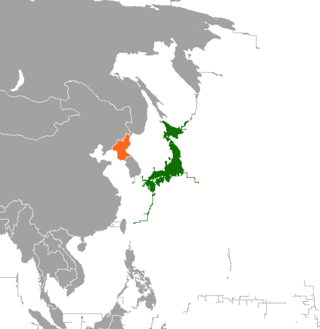
The Japan–North Korea Pyongyang Declaration was signed in 2002, and was the result of a systematic Japan–North Korea summit meeting. The aim of the declaration was to provide low-interest long term loans to North Korea as well as economic assistance, including humanitarian aid, in accordance with the moratorium of nuclear missile development which has been in place since 1999. The Japanese government hoped to learn the fate of Japanese citizens by North Korea which, prior to the declaration, was unacknowledged.
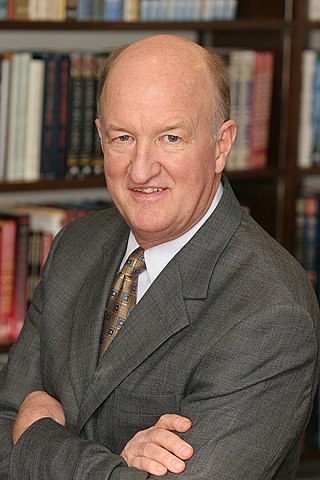
Mark Andrew Skousen is an American economist and writer. He currently teaches at Chapman University, where he is since 2022 a Doti-Spogli Chair in Free Enterprise at The George L. Argyros School of Business and Economics. He has previously taught at Columbia Business School, Mercy College, Barnard College, and Rollins College.

New Zealand–North Korea relations refers to international relations between New Zealand and North Korea. Relations between the two countries have been almost non-existent since the division of Korea. During the Korean War in the 1950s, New Zealand troops fought as part of the United Nations force that repelled the North Korean invasion of South Korea. Since then, New Zealand and North Korea have had little contact, until July 2000 when North Korean Foreign Minister Paek Nam-sun and New Zealand Minister of Foreign Affairs Phil Goff met in Bangkok, leading to the establishment of diplomatic relations in March 2001. The New Zealand ambassador to South Korea based in Seoul is also cross-accredited to North Korea. In 2006, North Korea tested its first nuclear weapon, drawing criticism and suspension of relations by the New Zealand government, which holds a staunch anti-nuclear policy. New Zealand began re-establishing formal relations in 2007, when the New Zealand Minister of Foreign Affairs Winston Peters visited Pyongyang on November 20 to discuss possible political and economic deals with North Korea, on the basis that it start dismantling its nuclear weapons facilities.

North Korean Review is a biannual peer-reviewed academic journal published by the Institute for North Korean Studies (INKS), at the University of Detroit Mercy in the United States. The journal was established in 2005 by INKS and McFarland & Company. It publishes policy-oriented articles, short papers, commentaries, and case studies on all aspects of North Korea, including culture, history, economics, business, religion, politics, and international relations.
Richard Eugene Sylla is the chairman of the board of trustees of the Museum of American Finance.

The International Law Institute, also known as the ILI, was founded as part of Georgetown University in 1955. The ILI provides training and technical assistance for the legal, economic and financial problems of developing countries and emerging economies. Since 1983, the ILI has been an independent, non-profit educational institution serving government officials, legal and business professionals and scholars from its headquarters in Washington, D.C. To date, the ILI and its global affiliates have trained over 39,400 officials, managers, and practitioners- from 186 countries- since it held its first seminar in 1971.
Selig Seidenman Harrison was a scholar and journalist, who specialized in South Asia and East Asia. He was the Director of the Asia Program and a senior fellow at the Center for International Policy, and a senior scholar of the Woodrow Wilson International Center for Scholars. He was also a member of the Afghanistan Study Group. He wrote five books on Asian affairs and U.S. relations with Asia. His last book, Korean Endgame: A Strategy for Reunification and U.S. Disengagement, won the 2002 award of the Association of American Publishers for the best Professional/Scholarly Book in Government and Political Science.

William A. "Sandy" Darity Jr. is an American economist and social scientist at Duke University. Darity's research spans economic history, development economics, economic psychology, and the history of economic thought, but most of his research is devoted to group-based inequality, especially with respect to race and ethnicity. His 2005 paper in the Journal of Economics and Finance established Darity as the 'founder of stratification economics.' His varied research interests have also included the trans-Atlantic slave trade, African American reparations and the economics of black reparations, and social and economic policies that affect inequities by race and ethnicity. For the latter, he has been described as "perhaps the country’s leading scholar on the economics of racial inequality."
Suk-Chae Lee is a South Korean businessman. Lee was the Chairman and CEO of KT Corporation from January 14, 2009 until November 12, 2013. He was South Korea's Minister of Information and Communication from 1995 to 1996.
A number of countries and international bodies have imposed international sanctions against North Korea. Currently, many sanctions are concerned with North Korea's nuclear weapons program and were imposed after its first nuclear test in 2006.
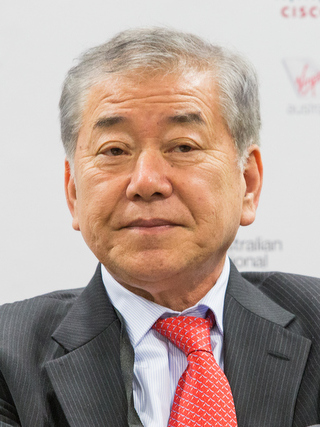
Moon Chung-in is a Special Advisor to President Moon Jae-in of South Korea for Foreign Affairs and National Security. He is also a Distinguished University Professor of Yonsei University, Krause Distinguished Fellow, School of Policy and Global Strategy, University of California, San Diego, and co-Convener of the Asia-Pacific Leadership Network for Nuclear Non-Proliferation and Disarmament (APLN). He is currently serving as the editor-in-chief of Global Asia. On 21 May 2017, Moon Chung-in was nominated by President Moon Jae-in as a special advisor on unification, diplomacy and national security affairs.

Vantage Point: Developments in North Korea was an English-language magazine entirely focused on North Korean news and analysis, published monthly between 1978 and 2016. It was published by the South Korean Naewoe News Agency and later by the Yonhap News Agency.
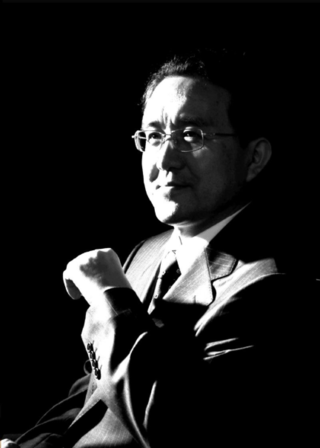
Pan Suk Kim is a South Korean professor in the field of public administration. He is currently a commission member of the International Civil Service Commission of the United Nations and the International Director of the American Society for Public Administration. He was an assistant professor of public administration in the School of Public Service at Old Dominion University in Norfolk, Virginia from 1991 to 1994. Kim is currently a professor emeritus of Public Administration in the Department of Global Public Administration, Yonsei University, Mirae Campus in South Korea.
Lisa Martin is an American political scientist. She is a professor of political science at the University of Wisconsin, Madison. She studies political institutions in international relations, including economic sanctions and cooperation between states. Martin was the first female editor of International Organization, where she also currently serves as a senior advisor to the journal's editorial board. In 2021, she was elected as president of the American Political Science Association for 2022-2023.

Sung Deuk Hahm is Dean of the Graduate School of Political Studies and Naun Professor of Political Science and Law at Kyonggi University. He is a Korean political scientist, well known for his work on the Korean Presidency.